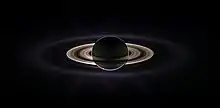eclipse
Anglais
Étymologie
- Du latin eclipsis.
Nom commun
| Singulier | Pluriel |
|---|---|
| eclipse \ɛ.ˈklɪps\ ou \ɪ.ˈklɪps\ |
eclipses \ɛ.ˈklɪps.ɪz\ ou \ɪ.ˈklɪps.ɪz\ |

An eclipse of the sun by Saturn, seen from the Cassini orbiter
eclipse \ɛ.ˈklɪps\ ou \ɪ.ˈklɪps\
Verbe
| Temps | Forme |
|---|---|
| Infinitif | to eclipse \ɛ.ˈklɪps\ ou \ɪ.ˈklɪps\ |
| Présent simple, 3e pers. sing. |
eclipses \ɛ.ˈklɪps.ɪz\ ou \ɪ.ˈklɪps.ɪz\ |
| Prétérit | eclipsed \ɛ.ˈklɪpst\ ou \ɪ.ˈklɪpst\ |
| Participe passé | eclipsed \ɛ.ˈklɪpst\ ou \ɪ.ˈklɪpst\ |
| Participe présent | eclipsing \ɛ.ˈklɪps.ɪŋ\ ou \ɪ.ˈklɪps.ɪŋ\ |
| voir conjugaison anglaise | |
eclipse \ɛ.ˈklɪps\ ou \ɪ.ˈklɪps\
- Éclipser, causer une éclipse.
- The Moon eclipsed the Sun.
- La lune éclipsa le soleil.
- The Moon eclipsed the Sun.
- (Figuré) Faire de l’ombre à quelqu’un ou quelque chose
- The student’s skills soon eclipsed those of his teacher.
- Les connaissances de l’étudiant éclipsèrent bientôt celles de son professeur.
- The student’s skills soon eclipsed those of his teacher.
Prononciation
- \ɛ.ˈklɪps\ ou \ɪ.ˈklɪps\
- États-Unis : écouter « eclipse [ɛ.ˈklɪps] »
Espagnol
Étymologie
- Du latin eclipsis.
Cet article est issu de Wiktionary. Le texte est sous licence Creative Commons - Attribution - Partage dans les Mêmes. Des conditions supplémentaires peuvent s'appliquer aux fichiers multimédias.